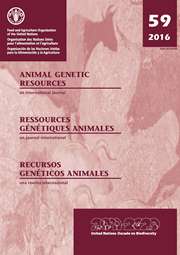Article contents
Characterization of Mehsana Buffaloes in India
Published online by Cambridge University Press: 01 August 2011
Summary
Mehsana buffalo is distributed in Mehsana, Banaskantha and Sabarkantha districts of North Gujarat in India. The animals are reared for milk production. The management practices in the breeding tract were studied. The physical, production and reproductive characters were recorded. The Dudhsagar Research and Development Association located in Mehsana district has undertaken breed improvement programmes in farmers'herds by running field progeny testing and providing other animal husbandry services like artificial insemination, health coverage, etc. This has resultedin the improvement in the reproductive performance as is evident from the decreasein the average first service period by 74 days and the average first calving interval by 103 days from 1989 to 1997. Microsatellite DNA marker analysis was carried out on 25 Mehsana buffalo DNA samples using seven markers for genetic characterization of the breed. Number of alleles at different loci ranged from four to seven and heterozygosity ranged from 0.40 to 0.92.
Resumen
La raza Mehsana de búfalos se encuentra en los distritos de Mehsana, Banaskantha y Sabarkantha en el norte de Gujarat en la India. Estos animales se crían para la producción de leche. Se han estudiado las prácticas de cría de esta raza en su entorno. Se han registrado los caracteres físicos, de producción y de reproducción. La Asociación de Investigación y Desarrollo Dudhsagar, en el distrito de Mehsana, ha empezado programas de mejora de la raza con los rebaños a través de pruebas de descendencia sobre el terreno y proporcionando otros servicios tales como la inseminación artificial, la copertura sanitaria, etc. Todo ello ha llevado a un incremento del rendimiento reproductivo ya que se ha disminuido en media de 74 días la primera monta y el intervalo entre partos de 103 días entre 1989 y 1997. Se han llevado a cabo análisis de los marcadores ADN microsatélites con 25 búfalos Mehsana con muestras de ADN, utilizando siete marcadores para la caracterización de la raza. El número de alelos en los distintos loci iban de cuatro a siete y la heterocigosis de 0,40 a 0,92.
- Type
- Research Articles
- Information
- Animal Genetic Resources/Resources génétiques animales/Recursos genéticos animales , Volume 28 , April 2000 , pp. 53 - 62
- Copyright
- Copyright © Food and Agriculture Organization of the United Nations 2000
References
- 5
- Cited by


